Anonymous submission to MTL Counter-info
Here is a zine detailing how anti-extractivists can disrupt coal rail infrastructure utilising the tactic of unloading coal trains. Each page has been uploaded as an image.
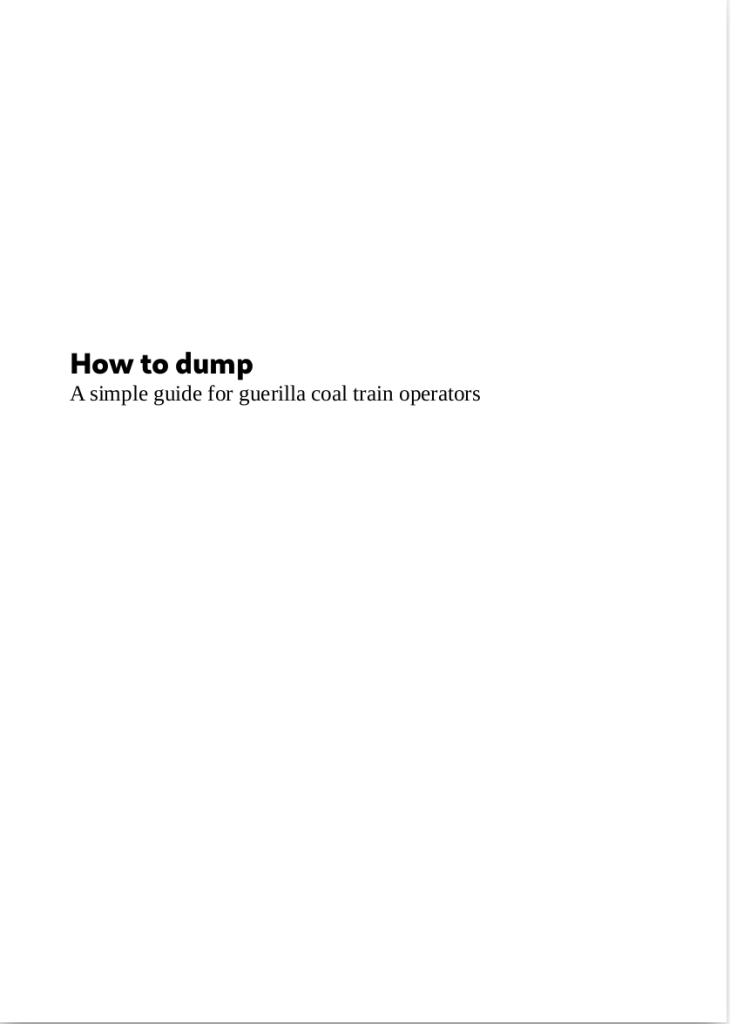

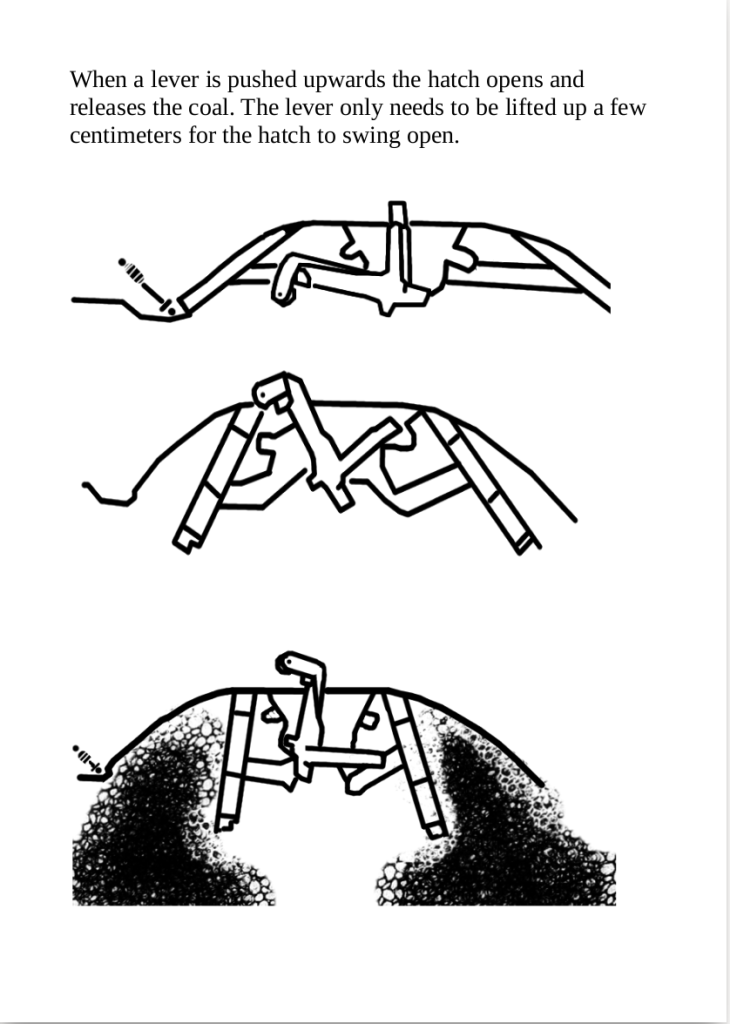



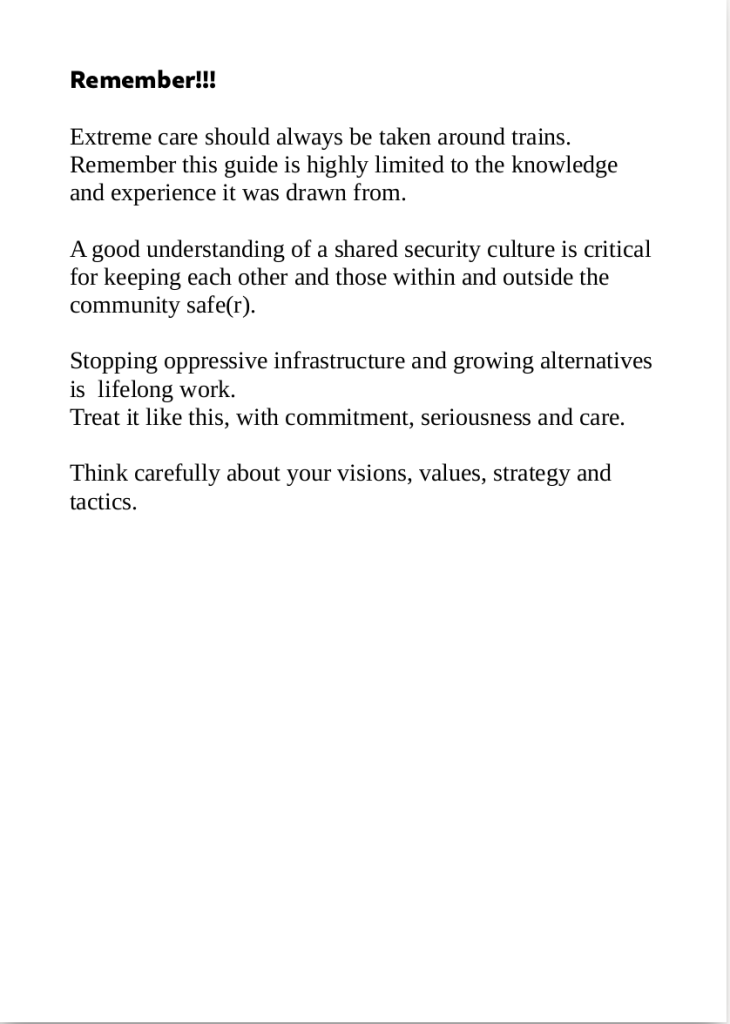
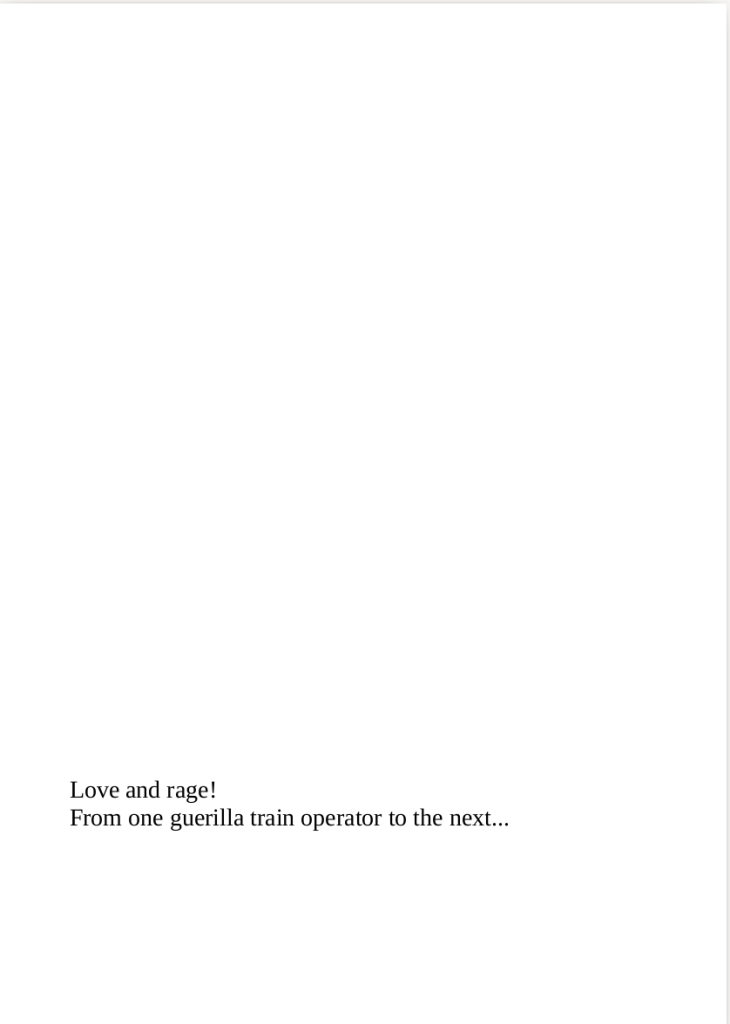
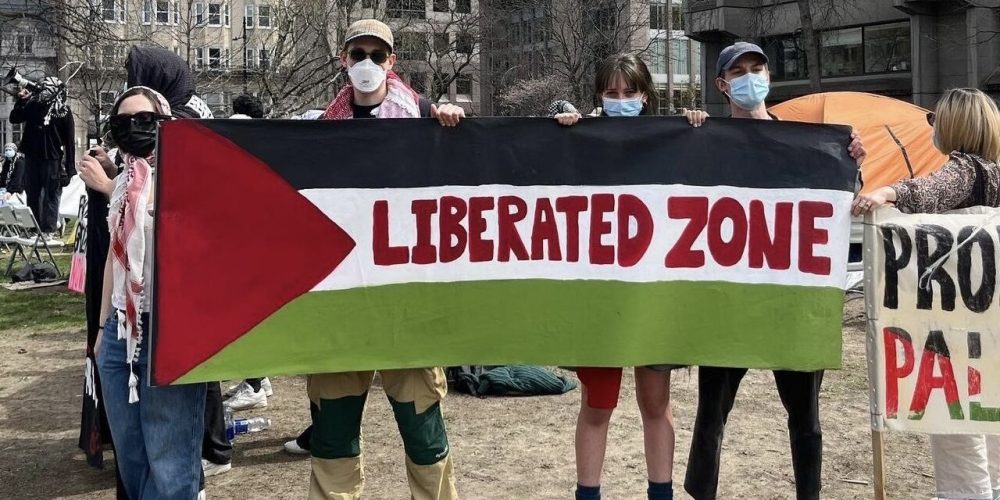
Anonymous submission to MTL Counter-info
The summer of Montreal came crashing into full force as the encampment movement bloomed across university campuses around the world. For many of us, it was the first time being apart of something bigger than us, challenging the status quo and experiencing a level of violence both from the institution and state. Even with all of this, and the many strides that were made, the connections that were made, we aren’t without fault and mistakes.
As I write this, I made the conscious decision to submit this piece anonymously both because of fear of being tied to the encampment movement and because of organizational entities that deemed themselves as leaders, who made existing within the camps an increasingly hostile environment. I believe the act of anonymity will allow a more honest reflection.
Liberalism & Counter-Revolutionary Dynamics:
What sets our tactics apart from liberals isn’t simply a matter of “diversity of tactics” that many of us might believe, but rather a fundamental disagreement on how material societal change occurs.
Liberalism promotes change through established institutions and democratic processes, it advocates for reform, with the current existing system that we spend so much of our time protesting and resisting against. The liberal agenda hopes to stabilize and improve the current system rather than overthrowing it.
Contrasting this with our tactics of militancy and a framework built on direct action, we reject the premise of incremental approaches and reform. We are in favour of immediate and significant upheaval, we are driven by the belief that freedom will only come through material radical change. I.e. real disruptive protests, strikes and economic sabotage to name a few.
It’s liberalism that attempts to convince us that the rule of bourgeois law and so-called “democratic institutions” are worth engaging with.
When in reality these rotten, immoral institutions are what brought the indescribable suffering of Palestinians, these institutions are the very tool that finances and supports genocide.
The summer has left a mark of a revolutionary zeal that ought to be put to use. It’s liberalism that comes to us with empty fluffy words, that come to us in the form of three to four letter orgs, these are the entities that attempt to delay us and prevent us from the kind of radical shift that has been needed within the global north since ’48.
We will not be convinced that this system is worth saving. We have no intention to reinforce structures that exploit us and our comrades around the globe by coming to a negotiation table. We have no intention in saving this system, our intention is to overthrow it by any means necessary, exactly what has been asked of us by the resistance in Gaza.
Peace Policing:
What has been a common reoccurring protest method, something that is not unique to Montreal, is the role of Yellow Vest/Protest Marshals. What was originally supposed to be a shield between protesters and police, has now become the first line of offense FOR the police. Myself and many others have witnessed the way yellow vests work in unison with police by giving out protest routes beforehand, controlling the way protesters express their anger and to maintain the dominance of a unelected hierarchal leadership to a specific organization. This past summer, all that the yellow vests have had to offer us is the strangling of enthusiasm, effectiveness and the inability to exhaust police resources correctly.
Orgs and groups who use this method of crowd control offer no protections and no culture of de-arresting. What the yellow vests accomplish is creating an environment that allows the job of the police be done for them. These protest marshals actively sabotage efforts of escalation in the hopes that playing by the rules will have their movements be seen as more “legitimate”. Yet, when has any demand been delivered by legitimacy alone? The mere act of standing against genocide has left a sour taste in the mouths of our enemies, is this who we must legitimize ourselves to?
I will close this section off with questions I have yet to find answers to. Who do the yellow vests protect when their back is to the police as they face the crowd? Who do they represent when they pull people off of sidewalks and pick up the trash cans that were thrown on to the ground, snuffing out our ability to move freely, and who do they mirror when they deicide how we protest?
Closing Off:
These past months have put us in an incredible position, one where we can reorient ourselves not to be stagnant. The movement must come together from many different fronts, where we can stand united not as a single banner but rather a mosaic of resistance, where the final blow against those who stand against us be laid.
My comrades and soon to be accomplices, there is no shortage of work.
With everything we know now, with all the mistakes that have been made, let us embark in the next part of this act, and may we be better equipped to handle whatever is thrown at us.
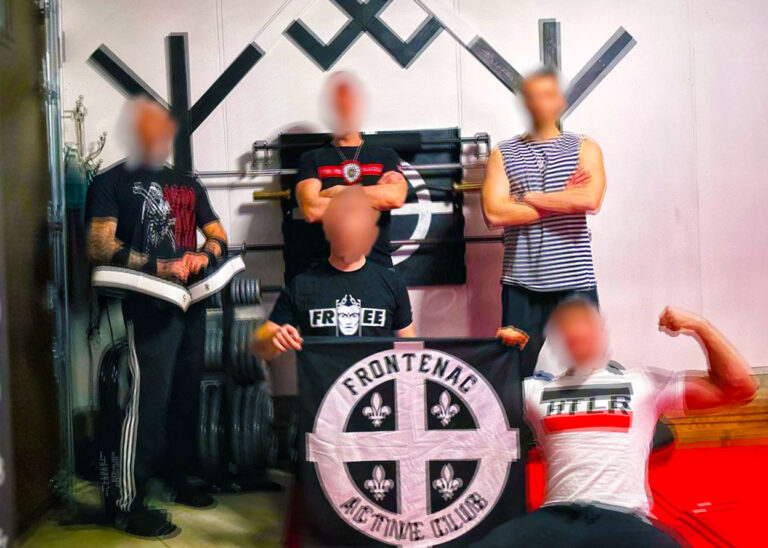
On December 8, 2023, the RCMP announced that they had arrested two Ontario residents, Matthew Althorpe and Kristoffer Nippak, and laid a number of charges against them stemming from their activities in various neo-Nazi projects in Ontario. In the first instance, the two men were charged with “participation in the activities of a terrorist group,” namely the Atomwaffen Division, an organization classified as terrorist in Canada. In its press release, the RCMP also mentioned two lesser-known projects: the Terrorgram Collective and Active Club Canada. The former is described as “a group of Telegram channels that share neo-fascist ideology and that produce and share manuals on how to carry out racially-motivated violence.” The Active Club is described as follows:
The Active Club Network are decentralized cells of white supremacy and neo-Nazi groups, which are active in many U.S. states, with multiple chapters in other nations, including Canada. The network was created in January 2021 and it promotes mixed martial arts to fight against what it asserts is a system that is targeting the white race, as well as a “warrior spirit” to prepare for a forthcoming race war.
Active Club Canada, of which the two defendants are members, sees itself as a regional hub of the Active Club international network.
On December 1, shortly before the arrests, Vice News published a detailed exposé by freelance journalist Mack Lamoureux on Kristoffer Nippak and his key role in the Active Club network in Canada, particularly in the Ottawa region. In his article, Lamoureux mentioned a regional chapter in Québec, but, until now, this local group has not been the subject of close scrutiny. This article aims to fill that lacuna by shining a light on the core of the Frontenac Active Club (FAC), currently the main “militant” neo-Nazi project in Québec.

Actives Clubs constitute a decentralized network of local groups rooted in white supremacist and neo-Nazi ideology. They represent a renaissance of the “white nationalist” movement (sometimes referred to as White Nationalism 3.0), picking up where the white power currents of the 1990s and 2000s and the alt-right movement of 2016–2020 left off and promoting a structure with no formal leadership. The origin of the movement is generally attributed to American militant Robert Rundo, who previously founded the Rise Above Movement (RAM) in California, in 2017, when the alt-right was at its zenith. RAM’s stated purpose was to physically attack enemies of the white nationalist movement.

In line with this, the main activity of the Active Clubs is training in various martial arts techniques in preparation for the coming race war, deemed inevitable based on a perceived “white genocide,” effectively the deliberate replacement by means of “mass immigration” of the majority-white populations by non-white populations in Western countries (orchestrated by a nebulous elite generally presented as a cosmopolitan “international Jewry”). Active Club members unreservedly subscribe to this “Great Replacement” conspiracy theory and are deeply rooted in contemporary neo-Nazi counterculture, for example, worshiping Adolf Hitler and the Nazi party, as well as advancing a negationist interpretation of the Holocaust and World War II. They are, of course, steeped in a violent imaginary imbued with antisemitism, racism, misogyny, homophobia/transphobia and a visceral hatred of inclusive and egalitarian social movements—both liberal and radical—which are generally sweepingly categorized as “communist” (hatred of communism is a consistent reference point and a core value).
There is evidence of an Active Club presence in thirty-three US states and at least twelve countries, probably more by the time you read this. According to Vice News, there are at least eleven local Active Club chapters in Canada, including the FAC, which is based mainly in the Greater Montréal Area.
Despite his legal setbacks, Robert Rundo remains an emblematic figure in the movement, and Southern California still seems to be its epicenter, with a gathering of Active Club chapters expected there in August 2024 (the first such event was held in San Diego in August 2022). Rundo has his finger in a number of pies, including distributing Will2Rise (W2R) clothing, whose colors are often worn by Active Club members as a nod to their mentor.

The Frontenac Active Club was formed in early 2023 (the Telegram channel was created on February 16) and is the direct descendent of the local White Lives Matter (WLM) group, which we wrote about in 2022. One of the group’s two leaders mentioned in that article, Laval’s Raphaël Dinucci, would become the mainstay and motive force of the FAC. Dinucci immediately forged links with the movement’s Ontario chapters, while gathering a core group of five or six militants who formed what is now the FAC.

We know that the FAC still maintains virtual links with other Canadian Active Clubs, notably with the group that was the subject of the RCMP raids, as well as with southwestern Ontario group Nationalist-13 (13 = AC, for anti-communist).


The group’s activities are centered in the Greater Montréal Area, with its members scattered across the south shore (Saint-Hubert, Saint-Jean-sur-Richelieu), the north shore (Laval), and as far away as Lanaudière (Rawdon). There also seems to be a handful of members/sympathizers in the Québec City area, but they hardly constitute a section as such, since their activity last year was limited to stickering and a few social outings in the Capital.


To foster the racist and misogynistic fraternity spirit that underpins the movement, membership in the FAC is limited to white men.
The group’s Twitter/X account was created in April 2024. Raphaël Dinucci also has a personal account.
(This platform, under the leadership of billionaire Elon Musk, has [re]become a safe space for neo-Nazi and supremacist individuals and groups, reversing the previous administration’s purge. It’s also a space where misinformation and hate speech have free rein, with virtually no countermeasures, to the degree, in fact, that it seems pointless for us to maintain a presence there.)
True to form, FAC members train quite regularly in martial arts—unevenly from member to member—usually in a public park near you, particularly on the outskirts of Montréal (Longueuil, Laval). Their other main activity is to showcase themselves on their Telegram channel, posting group photos documenting their activities. Last April, members of the core group photographed themselves posing after a workout in Mackenzie-King Park, in Montréal’s Côte-des-Neiges neighbourhood, across the street from a synagogue and a Jewish school and a stone’s throw from the Montreal Holocaust Museum.

Shawn Beauvais MacDonald, whom we had suspected was in contact with the Active Club, turned out on this occasion, confirming our suspicions. There’s nothing to indicate that Beauvais MacDonald had been a regular member of the group before this year, but it’s clear that neither he nor his cronies have any problem with the baggage he brings with him. Indeed, recently, Beauvais MacDonald appears to have taken on an increasingly central role in the group, representing it in a friendly boxing tournament against the Nationalist-13 Nazis and providing his personal contact information to people who want to get in touch with the FAC.

The appalling ignorance of the group’s members is matched only by their extreme fetishization of a cult of the body that clearly reflects the toxic masculinity traditionally imposed in far-right circles. Overall, the FAC seems like nothing more than a social club for Nazi rejects, with its members organizing weekend nature hikes (Mont Gorille, Laurentides, or Montagne Noire, Lanaudière, for example) or a game of badminton at Laval’s Carrefour Multiport, generally followed by a beer at some nearby bar.




Along with its physical activities and ostentatious social media presence, the group also hopes to raise its profile around the city, taking a page out of the WLM playbook and heavily stickering in Greater Montréal and several other localities, including Saint-Jean-sur-Richelieu, home of FCA member David Barrette.



As for public mobilization, Raphaël Dinucci and David Barrette had the curious idea of showing up at a demonstration against drag queen story hour and the queer and trans community, in Sainte-Catherine, on April 2, 2023. It didn’t go well for either of them; Dinucci was beaten and then arrested by police, while Barrette was charged with assault (dropped last spring). In a similar vein, FAC activist Martin Brouillette sent explicit threats to the organizers of the « Nous ne serons pas sages » demonstration last March, under his pseudonym “Martin Leblanc.” He failed to follow up on his threats.




A June post on the group’s channel shows member Mathieu Grenier in France, hanging out with nationalist militants from the Marseilles region.
Whether under the Active Club banner or its previous moniker White Lives Matter, it’s clear that this small core of neo-Nazi militants hopes to carve out a niche in Québec’s far-right milieu.
The FAC falls, first and foremost, within a North American white nationalist and neo-Nazi tradition, representing the most radical fringe of the alt-right and its historical predecessors. It also draws upon key North American conspiracy theories (“White Genocide” and the Great Replacement), including embracing the moral panic around freedom for sexual and gender minorities. It’s worth noting that WLM/FAC activists were spotted protesting when the Covid health measures were in place, and then from spring 2023 onward were found on the margins of transphobic activities organized by the usual suspects from the local complosphere. The FAC also maintains links with the Canadian Active Club network, including, as noted earlier, the neo-Nazi groupuscule Nationalist-13, and with the Diagolon network, primarily on Telegram in the latter case. During its recent “Canadian tour,” Diagolon stopped in Montréal, where its members fraternized with the boys from the FAC.



FAC members also flirt with “arrow-sash” fascism. For example, they have participated at least once in the horrifying “Saint-Jean de la race,” organized by Alexandre Cormier-Denis’s ethnonationalist Nomos-TV propaganda channel. For the past few years, these festivities have taken the form of a Nomos live transmission on June 23, followed by an intimate fascist-fest. Raphaël Dinucci was present at the 2022 edition in Québec City (at Bar Le Duck), hanging out with members of the neo-fascist group Atalante and Sylvain Marcoux’s neo-Nazi Parti nationaliste chrétien (PNC),with whom FAC has been on friendly terms since the WLM days. We have good reason to believe that Dinucci was also present at this year’s edition of the Nomos Saint-Jean event, held for the second year running in Montréal at Lux Média, André Pitre’s “reinformation” project. (Beauvais MacDonald made an appearance last year.)
The key thing is that these neo-Nazi “militants,” who imagine themselves playing a leading role in an imminent race war—as white race crusaders, obviously—are an integral part of the far-right ecosystem in Québec. Although they remain relegated to the margins, they unquestionably play a role, if only as a foil for other far rightists who can take the opportunity to portray themselves as “less worser than.” While they may not be united on every issue, it’s important to understand that all the groups and currents mentioned in this article and in other recent Montréal Antifasciste material (from the Nazis 3.0 of WLM/FAC through the Nouvelle Alliance ethnic nationalists to the transphobic conspiracy theory adherents, the Nomos cryptofascists, and the wacky national socialists of the PNC) occupy a specific space in a single ecosystem, where they tend to reinforce each other.
It’s also important to remember the key role played by certain figures in the mainstream media (need we even name them?) in normalizing the far right—by repeating as often as possible that it simply doesn’t exist.

Raphaël Dinucci
Telegram: @Raph131
@adamm1313
Address: 5346 Pauzé, Laval QC H7K 2M5
Raphaël Dinucci is most likely the founder and primary mover of the FAC. He first appeared on our radar in 2022 as co-administrator of the White Lives Matter Québec Telegram channel, using the pseudonym “Whitey,” alongside Yannick Lachapelle, alias “Nord-Est.” Together, they formed the hard core of that short-lived group.


From the outset, Dinucci has distinguished himself by his intense activism, particularly on the streets of Laval, which he covered with stickers and graffiti.

When the article titled White Lives Matter: Neo-Nazi Project Has a Québec Franchise came out in March 2022, Yannick Lachapelle disappeared into thin air, and Dinucci found himself alone. We know that he went about building links with Ontario members of WLM and the Active Club, and that’s when he had the idea of upping his game and founding the FAC.


Dinucci appears in almost every photo of FAC activities and is in charge of public relations for the group, whether getting together with members of the Drummondville-based PNC or attending the various editions of Nomos-TV’s aforementioned annual “Saint-Jean de la race,” a major gathering of the fascist far right in Québec.
As mentioned above, he was present at the rally in Sainte-Catherine on April 2, 2023, with David Barrette and Sylvain Marcoux (PNC), where they unfurled a banner reading “Sales pédos hors du Québec” [Dirty Pedos Out of Québec], which was torn out of their hands after a few seconds.
He lives with his father in Laval.
David Barrette
Telegram: @NatSocSiD
Address: 863 rue Saint-Jacques, Saint-Jean-sur-Richelieu
David Barrette has been a hyperactive keyboard neo-Nazi for years, primarily under the handle @NatSocSiD (he has several others) on numerous virtual platforms, including Telegram, Discord, and the Undernet chat network’s #Montreal IRC server. He’s also active on YouTube, BitChute, TikTok, and several other platforms. He was a member of the WLM group in 2020 and, along with Dinucci and other sympathizers, naturally transitioned to the FAC at its inception.

His activity and involvement with the FAC are limited by a chronic ankle injury. However, this did not prevent him from accompanying Raphaël Dinucci on an “in real life” adventure in Sainte-Catherine on April 2, 2023, which resulted in his arrest on assault charges (withdrawn last March, for reasons unknown to us). We believe these legal setbacks have dampened his enthusiasm for political activism, but he remains very close to the FAC’s core group.

David Barrette lives in Saint-Jean-sur-Richelieu and works in Montréal for the information technology company Globotech Communications, which specializes in Web hosting. The information we have gathered leads us to believe that he uses his privileged position within this company to clandestinely host neo-Nazi and white supremacist sites and services on the company’s servers.


Barrette’s employer would undoubtedly be interested to know about his employee’s extracurricular activities and may even be interested in scrutinizing the servers under his supervision.
Globotech Communications :
sales@globo.tech/support@globo.tech / abuse@globo.tech / NOC@globo.tech
Telephone : (514) 907-0050 or 1 888-482-6661
(Note that Barrette receives messages requesting support and is likely to filter them; it is, therefore, advisable to write to several addresses to ensure that the message reaches the appropriate people.)
Martin Brouillette
https://www.facebook.com/martin.brouillette.7/
Telegram: @M_clean
Address: 5900 chemin Bélair, Rawdon, QC, J0K1S0
We first got wind of this sinister character last March, when Nous ne serons pas sages—a grassroots group formed to counter the anti-LGBTQ backlash and the CAQ government’s so-called “Comité des sages”—contacted us to share violent and hateful threats received from a certain “Martin Leblanc.” The latter said he wanted to “meet up” so that he could “remove pedophiles and trans people from this world,” and that he would “meet them on Fullum” (the location of the Committee’s demonstration). In another equally violent message he said he was “a fascist, violent, ready to clean house,” and that he had “already spit on Jews and gays” and would like to “continue [his] journey.”
We easily found a “Martin Leblanc” on Telegram (“My Ancestral Calling” channel), with a profile whose white supremacist character leaves no doubt (Hitler homage, etc.). His profile photo shows him in a gym with walls that are lined with neo-Nazi symbols and a flag from the FAC; this is the same gym seen in some of the photos posted by the group on its own channel.



This profile enabled us to find his real name, Martin Brouillette—his Facebook account has the same profile photo as the Telegram account of “Martin Leblanc.” On it, he bluntly describes himself as a “fascist” in his bio. (By the way, Facebook’s bots seem less and less able to recognize neo-Nazi or white supremacist posts or even to note profiles that spell out “fascist” in plain text and display hateful content. All of this goes undetected in this AI Brave New World).

Photos posted by Brouillette on his Telegram channel tell us that he trained at a private martial arts club in Saint-Charles-Borromée (Joliette), whose managers were evidently unaware of his activism (see the update below). In the same way, we were able to determine that his private gym, where he invites his fascist buddies to roll around on the floor, is located in his garage on chemin Bélair in the municipality of Rawdon.


Update: Following the publication of this article and the steps taken to contact the managers at Karaté Kanreikai Joliette, we have been assured that they have taken the necessary steps to exclude Martin Brouillette from the dojo for good. This decision is to their credit.
Shawn Beauvais MacDonald
Telegram: @FriendlyFash
Holy fuck! to use a well-worn phrase. This drunken idiot is actually involved in every wrong thing, so much so that at some point the other Nazis will have to realize that he’s toxic, and that everything he touches turns to shit. In any case, he has no notion of operational security, and his trivial Nazi life is an open book, which sooner or later exposes his equally trivial comrades. What could we possibly say about this piece of shit that we haven’t already said a hundred times?
As noted, since 2023, we’ve suspected Beauvais MacDonald of playing some role with the FAC, whether a key one or on the margins, but we had no proof. Last April, however, he began posting photos with the group on his Telegram account, after which the group decided to make him a poster boy on its own Telegram channel. Recently, he has been an increasingly central figure in the group. It’s worth noting that his arrival on the scene coincided with the jiu-jitsu training session outside of a synagogue in Montréal’s Côte-des-Neiges neighbourhood mentioned above.


Incidentally, it seems that Beauvais MacDonald has recently become even more of a loose cannon. We’re told he’s been seen more than once threatening members of the public who recognize him (whom he obviously presumes are the famed “antifa”). What’s more, he seems to have hooked up with young Sandrine Girardot from Châteauguay, who gained public attention last March for painting hateful graffiti in that town, including on the building she lives in. She has also posted a series of completely insane publications and videos on her social media accounts, the latter showing her and Shawn Beauvais MacDonald verbally assaulting passers-by with invectives and racist and homophobic insults in various neighborhoods and in the Montréal metro, as well as shouting their admiration for Adolf Hitler and throwing ridiculous Nazi salutes.
When we publicly reported this neo-Nazi tryst, Beauvais MacDonald responded with explicit threats:

Mathieu Grenier
Mathieu Grenier uses the alias “@matthewattic” on Telegram. We don’t know much about him, apart from the fact that he has red hair and was once involved in Montréal’s (very short-lived and essentially virtual) Proud Boys group. He recently took a trip to Marseille, where he socialized with local fascists.
Steven Khazanov
Khazanov uses the alias “@stvjms” on Telegram. He lives on Montréal’s South Shore and has participated in several FAC activities over the past year.
His profile picture on Telegram shows him training in the outdoor facilities of Parc de la Cité, in Saint-Hubert. He resides at 3133, rue Ovila-Hamel, in Saint-Hubert.
///
So as not to hinder our investigations, we have chosen not to include all the information we have in this article. We do, of course, continue to collect information on active members of the Frontenac Active Club. If you have any information about these or other individuals connected with or involved in the group, please write to us at alerta-mtl@riseup.net.
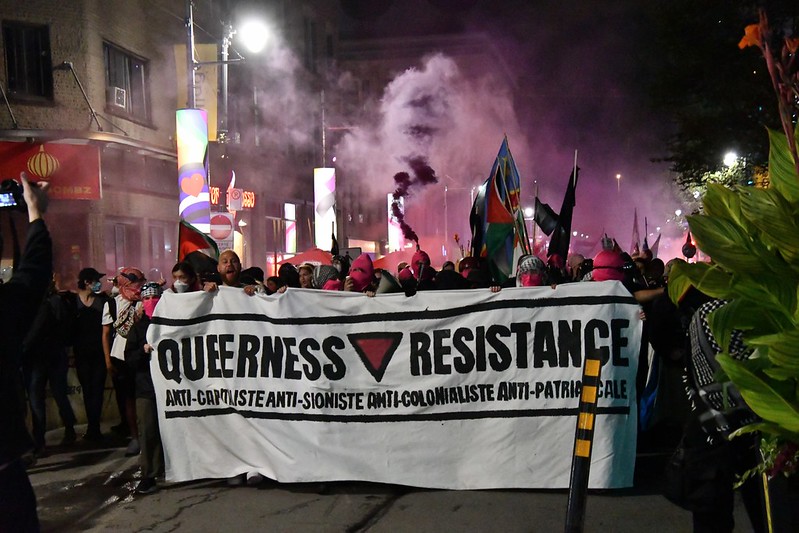
Anonymous submission to MTL Counter-info
Sunday, August 10th was the second annual edition of Rad Pride. Over 250 people gathered at Papineau metro, pink balaclavas mingling with black bloc and our gayest demo attire. Under the rallying cries of “No pride in genocide” and “Queerness is resistance”, the march set off down Sainte-Catherine. Now, a couple weeks later, we want to offer a look back at this evening from a tactical perspective.
On Side Banners
The conflict between reinforced side banners and “side cops” has become a mainstay of combative Montreal demonstrations. Montreal’s reinforced banners are banners with a wooden frame, held by screwed in door-handles, used to protect against riot cop charges and hits by police batons. Over the summer, with terrasses and crowds often obstructing the sidewalks, the cops have apparently received orders to enter the street alongside marching protesters. It is essential to show the cops that this provocation is a grave error. A multiplication of reinforced side banner teams may be one of the best responses, but where these teams position themselves and how others in the crowd complement them are important to consider.
At Rad Pride, a single reinforced side banner took a position at the front, left corner of the march, and it rapidly escalated into a confrontation. After side cops began pushing the banner and banner holders refused to yield, cops ended up squeezed against a low terrasse wall. They began striking people with batons. One demo participants’ flagpole was used to strike a cop in the head from behind the banner. Unfortunately, the position of the side banner at the front made it easy to cut it off from the rest of the crowd, and with enough pepper spray and baton blows, the group around the side banner had to disperse in a chaotic melee that flipped several tables on a terrasse and led to two arrests.
The decision to not move the reinforced banner with more fluidity led to entrenched positions by both anarchists, on one side of the banner, and police, on the other. A tug of war ensued. In such a stubborn situation, one side will be pushed back and have their position compromised. It may have been possible to flank the police on all sides as cops concentrated their forces on pushing back the banner. But without the determination, numbers, or abilities to use entrenched positions to our advantage, we will often benefit much more from encouraging a reinforced banner to move with more freedom, not committed to any specific place in the demonstration (especially the front or back where it is the most isolated). This approach complements one of the main advantages of street fighters versus an enemy as powerful as the police – the ability for militants to attack and retreat, to use the element of surprise, dispersing and reforming.
A Headless March
The SPVM might have hoped that the attack on the front of the march would result in the whole crowd dispersing, but they had a long night still ahead of them. More experienced protesters improvised a new front banner team, encouraged the crowd to stick together, and quickly looped back onto Sainte-Catherine.
It was evident that the SPVM wanted to avoid the PR nightmare of tear-gassing crowds of party-goers in the Gay Village during Pride. Since these crowds were heavily concentrated on Sainte-Catherine, the demo was able to avoid dispersal by staying on that street. On multiple occasions, riot cops formed lines blocking our way forward and to the south; each time, rather than turn north off Sainte-Catherine, the demo turned on its heels and reversed, with multiple banners able to swap in as the new lead.
This game of ping-pong gave demonstrators multiple occasions to take action against the handful of targets along our route. Windows were smashed at RBC, BMO, a Remax office, and Starbucks. The latter was attacked repeatedly on at least three separate passes of the crowd. After the early clash, it took the cops close to half an hour to re-establish flanking side units, showing us that an openly confrontational element in the crowd can function as a diversion, creating space and time for groups oriented more towards destruction.
As the night went on, the vibe became increasingly more festive. Towards 11pm, the demo had become a dance party of still over a hundred people, as a line of fully-geared riot police looked on. Making a laughingstock of the authorities is a calling card of successful mass resistance movements throughout history, and we certainly shouldn’t write off the potential of making the SPVM in particular look ridiculous. The night’s victory was topped off when the riot cops retreated and returned to their vans, and the crowd sang “We Are the Champions”.
This type of conclusion is simply extremely rare for destructive demonstrations in this city. It is the result first and foremost of the determination and fearlessness of participants.

From the F.A.G.S.
On Sunday, the F.A.G.S. and its queer and trans accomplices disrupted Fierté Montréal’s corporate, Zionist, colonialist pride parade.
We gathered at 1pm in drag bloc outfits and makeup in the spectator zone at Place Ville Marie. Nearly a dozen cops with SIS armbands mobilized to surveil our gathering, as clearly a group of queers at pride protecting each other from COVID is cause for suspicion. At around 1:30pm, towards the beginning of the parade, we took to the street as Helem, Mubaadarat, and Independent Jewish Voices’ Queer for Palestine float passed by. By marching behind their float as part of the parade for a short while, we managed to sooth the fears of the anxious piggies.
After briefly marching, we stood in place and deployed an extra-long banner to begin dispersing and disrupting the parade and deliver a speech on Fierté Montréal’s corporate pinkwashing. After this, we communicated with the members of the AGIR float behind us, allowing them and several other community floats pass and continue parading, before blocking the Bubly sparkling water float.
We continued marching and zig-zagging backwards through the parade, largely evading police intervention and briefly blocking various floats tied to Zionist corporate interests. Floats and contingents in solidarity cheered us on and raised their fists as we passed. A small contingent carrying Zionist flags approached. We attempted to block them by rapidly deploying a second extra-long banner, but police brutally pushed us to the side of the road and stole our banner.
As cop presence began to escalate, we decided to switch directions and march back towards the front of the parade, following and protesting the Zionist contingent. After halting the parade several times on our way back towards the front, we stopped at Jeanne-Mance and René Levesque. Here, we blocked the entire back portion of the parade, where almost all complicit floats were located.
During this time, police, Zionists, private security and Fierté marshals attacked and insulted us while bystanders cheered us on and chanted with us. Autonomous members of the Helem, Mubaadarat, and IJV contingent came back to join us after their successful and poignant die-in disruption. Other members of the community responded to our public call for support. Our numbers were boosted to around 150 demonstrators.
As pigs multiplied and donned their riot gear, as prisoner transport vehicles arrived, as Fierté begged us to allow their corporate parade to continue, as Zionists threw projectiles at us, as the hot August sun beat down on us, we stood our ground.
As cops shoved us, pulled us, hit us with batons, tried to steal our materials, threatened us, and brutalized us in front of a crowd of our fellow queers, we remained steadfast and defiant.
We blocked the parade at Jeanne Mance for nearly an hour before police and class traitor Fierté marshals worked together to redirect the parade to the other side of the median.
After the parade went by on the other side of the road, we marched down René Levesque chanting slogans against pinkwashing and police. The vast majority of bystanders cheered us on, while certain bystanders shouted racist vitriol at us, showing their true colours as Zionist, capitalist, colonialist white cis men. We eventually dispersed into the Metro. No arrests were made.
Though we didn’t manage to cancel the parade outright, we consider this action successful.
We blocked corporate floats long enough that many of their potential spectators further along the parade route left out of boredom. We showed queer bystanders and the media that police are not afraid to brutalize queers during a pride parade. We reminded the world that pride started as a riot against the police, not as a parade sponsored by corporate interests. We showed that as queers of conscience in Tio’tià:ke, like in Tkaronto, the Coast Salish territories colonially known as Vancouver, and elsewhere across Turtle Island and around the world, we will not accept a genocide in our names.
Fuck pinkwashing
Fuck Fierté Montréal
Fuck the police
No justice
No peace
Photo: @the_purple_line


Anonymous submission to MTL Counter-info
Those who make a profit off misery deserve nothing less than an open war.
War on landlords, power to tenants.
Seen in Sillery (Quebec City).
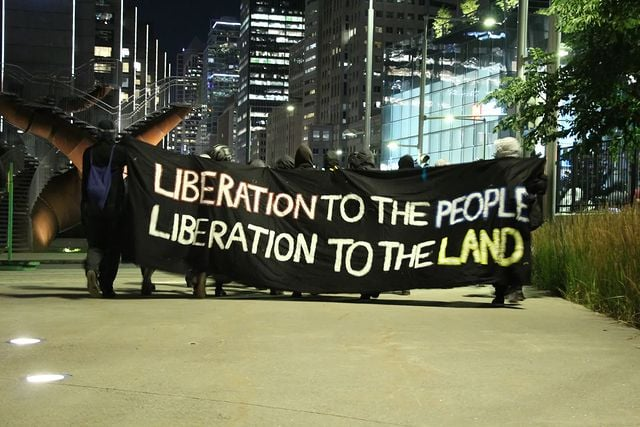
Anonymous submission to MTL Counter-info
On July 19th, under a calm night sky, over 60 people assembled in downtown Montreal to march for Palestine. The demonstration was publicized without using social media, resulting in no police presence visible at the gathering location. The account that follows comes from a couple of participants in the demo. We hope to share an understanding of what went down for those who weren’t there and make some suggestions for next time.
Around 10pm, the march set off, a front banner announcing “L’espoir c’est la lutte” alongside a circle-A, and a banner reading “Liberation to the people, liberation to the land” bringing up the rear. Snaking through streets beneath skyscrapers and chanting, the energy in the crowd gradually rose as we acclimated to the strange reality: no bike cops, no riot cops, no cops in front, in back, or on the sides, just us and our friends and comrades, and their friends and comrades, and theirs, our black bloc and keffiyeh bloc protecting us from the hundred or so surveillance cameras that would inertly record our stroll.
The march lasted sixteen minutes. Fireworks were set off upon reaching Square Victoria, site of the Al-Soumoud camp, dismantled two weeks prior. Demonstrators quickly began breaking bank windows, hitting a CIBC and Scotiabank. Heading against traffic on Saint-Jacques, we were greeted ecstatically by Friday night party-goers, who stepped into the street to cheer, and drivers who rolled down their windows to high-five black-gloved militants. Some supportive passersby began excitedly following the demo as it continued towards the Caisse de Dépot et Placement du Québec (CDPQ). The CDPQ, which had been singled out by the Al-Soumoud camp a block away, has $14 billion invested in companies complicit in the genocide in Palestine. Though its windows appeared challenging to break, several were tagged, several others shattered, and a smoke device was tossed through an opening into an office space, hopefully setting off sprinklers and causing water damage.
Police sirens could be seen and heard from multiple directions, but before SPVM commanders understood what was happening, the crowd dispersed and disappeared into the night. There were no arrests, and no one was injured.



While corporate media ignored the demo, video showing the march and direct actions circulated widely on social media, including on an arabic-language account with hundreds of thousands of followers.
The local struggle in solidarity with Palestine has seen a fair variety of tactics tested in short order over the past nine months. Night demos organized without inviting the police are a new one in this context. We may want to consider doing more of them.
A week earlier on July 12th, the SPVM sent riot cops to flank both sides of a small night demo announced on social media following the dismantling of the McGill camp. The cops entered the street alongside the march and pre-emptively attacked a side banner, ripping the banner out of people’s hands, swinging batons and deploying enormous quantities of pepper spray. The crowd’s tenacity was impressive, but it was not possible to overcome this degree of police violence and begin transforming the march into something greater. One role that a night demo without police can play is to respond to events like these, tending to our militant spirits and repairing our confidence, while showing that the SPVM is putting its units in danger for nothing by intimidating and brutally repressing demos, because our targets will get smashed regardless.
We also want to reflect on how different forms of demonstrations make it more or less possible to reach beyond our existing networks. What is striking in the interactions with enthused passersby on July 19th is how the normal police presence at a combative demo would have rendered these interactions impossible. Police doing traffic control typically redirect all vehicles away from a march, and the scale and aggression of police units on all sides of a demo is extremely intimidating, limiting the possibilities for action in the minds of onlookers – and objectively. No unprepared civilian in their right mind would try to join us. Without the separation imposed by the police, we can imagine doing more in the future to enable willing passersby to take the street with us. This could look like bringing a supply of masks to distribute to people, explicitly inviting them to join, and quickly sharing any important safety information in a friendly way with joiners.
A number of windows on the demo route unfortunately withstood the blows of hammers and rocks. This raises a question of tools. Chunks of porcelain as projectiles are more effective at breaking windows than either hammers or rocks. They’re also harder to source (ask a comrade), and more care must be taken when throwing to avoid injuring anyone. In the future, perhaps “hammer teams” could make the first attempt, and if a target proves too challenging, hand it off to a “porcelain team”.
The enthusiasm for this new tactic shows that the community is looking for a new format for demos. Beyond shattered windows, exploring what autonomous groups can do within demos without police suggests new horizons. We can test new tactics and mixes of old ones, or even police response times around different strategic areas in the city. We can also improve our speed and comfort level employing different tactics so we are not attempting things for the first time with cops breathing down our neck.
With the challenges of the past few months in demos announced on social media, even in contingents, perhaps this new format can also be seen as a mobilizing strategy. If we play our cards right, we can use it to speak to the public, spreading anarchist ideas and practices, so when we show up as a contingent in a public demo our orientation is known to those around us and they might be more encouraged to join us in actions. Hopefully, it will allow us to strike a balance, to be ready to raise the stakes and be strategic in enacting a successful plan, as well as being ready to respond combatively to police violence in bigger public demos alongside hundreds or thousands of others.
Friday raised morale, built confidence and strengthened bonds of complicity. We need to find opportunities to achieve wins even when they are small and celebrate them. The same tactic can be utilized at strategic moments like a major event in the city, or to achieve strategic goals on short notice, or in response to significant police repression.
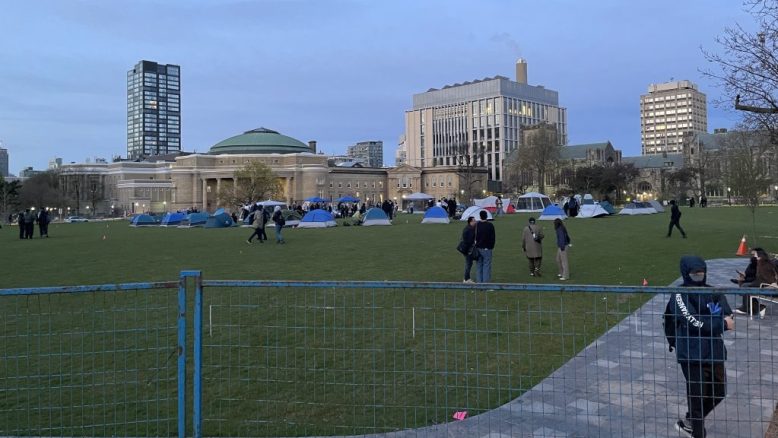
Anonymous submission to North Shore Counter-Info
As the zionist entity’s siege on Gaza enters its ninth month, the now-dead People’s Circle for Palestine at UofT joins the ashes of Northwestern, McMaster, and numerous others as an exemplar of liberal cowardice in the face of a livestreamed genocide. Not only did this encampment fail to deliver on its stated goals of disclosure, divestment, and termination, it betrayed both the people that made it possible as well as the movement at large. Far from opening up new terrains of escalatory struggle, the organizers of this People’s Circle spent the sixty-three days of its existence working tirelessly to make it a remarkable case study in defanging and dismantling the budding militancy of the local movement. It perverted its own promises, violated every principle of liberatory organizing; it wasted multiple weeks sabotaging the efforts of its own comrades while thousands in Gaza continued to be murdered. It turned something that could have been revolutionary for the city’s organizing scene to a summer camp that years on will likely be remembered with nothing but shame. It was a disappointment and a disgrace.
Red flags had existed right from the moment it was launched, but one could be forgiven for having been optimistic back when the encampment was still within its infancy. For many in the city who were disillusioned by months of pointless rallies and hungered for more, there had initially been a few things to be optimistic about. By Toronto’s unfortunately low standards, breaking open the fences of an enclosed privately-owned space to set up camp while multiple banner-wielding crews physically blocked the police from interfering was pretty damn militant. Yet this sole act of breaking and entering, it soon became clear, was where the line was drawn. In the two months following the breaching of King’s College Circle’s fences, UofT saw not one single large-scale escalation for Gaza: no building occupations, no disruptions of Board of Governor meetings, not even convocation ceremonies were meaningfully targeted. In fact, forget escalation: even simple attempts to strengthen the encampment’s defenses were constantly shot down. Autonomous actors were repeatedly prevented even from building barricades and had to defy the organizers in order to reinforce the preexisting fences, and the tactics trainings independent crews had started in the camp were forced to a halt halfway through.
While encampments all across the world were courageously confronting police forces and taking on their universities in ever more creative ways, the organizers of the so-called People’s Circle chose to abandon the very possibility of a principled defense or strategic escalation, not only failing to build a movement that could sustain such a struggle but actively ensuring any elements that were interested in doing so were killed off. Rather than focusing on building up the community’s material capacity to defend itself and keep on escalating, the organizers focused on pandering to corporate media, on ‘deescalating’ confrontations with the pigs, on preventing any autonomous actions that might make them ‘look bad’ or ‘invite’ police repression. They devoted their time not towards principled resistance but towards crafting an image that portrayed them as ‘peaceful’ and ‘nonviolent’ in a futile attempt to initiate ‘good faith dialogue’ with a system that understands no language but violence. Instead of focusing on what they could do to continue targeting the infrastructures sustaining this genocide, they focused entirely on whether what they did remained legal, and whether it looked good on camera. And their flimsy excuses for taking this approach – namely that the risks of continued escalation were ‘too high’ to be worth it and that their priority was ensuring the continued ‘safety’ of all participants – remain precisely that. Flimsy excuses, rooted in an illusory liberal notion of ‘safety’ built on centuries of corpses.
Because there is no safety to be found in abiding by the laws of the state, nor is there safety to be found in pandering to its propagandists. It does not truly matter if an action is legal or not, because the law is fundamentally a weapon of the oppressor. If the armed swine that are supposed to enforce it are inclined to inflict violence, there is no law that will stop them. What can, however, is our own ability to evade capture, or to fight back. To defend ourselves not by appealing to the laws of our enemies but by the strength of our own ability. In the same vein, it does not matter if it looks good on corporate cameras – because for starters, no matter how legal and peaceful our actions are, it fucking won’t. Almost a year of witnessing corporate media’s relentless vilification of Palestine and her allies is more than enough proof that its sole raison d’être is to manufacture consent for genocide. Any positive press possibly gained by painting our actions at ‘legal’ and ‘peaceful’ comes at the cost of legitimizing the perceived necessity for legality and nonviolence – yet no act that poses a genuine threat to the state and its interests can ever remain either. Any ‘safety’ built upon seeking recognition and approval from the apparatus of our enemy is a ‘safety’ built on sand – and any ‘safety’ that disavows the praxis of genuine resistance is a ‘safety’ paid for in blood. Liberal notions of ‘safety’ within the imperial core are contingent upon our refusal to take the risks needed to end the continued slaughter of thousands of Palestinians. They are contingent upon letting people continue to face the ever increasing violence of manufactured poverty, of police and carceral brutality, of eugenicist policies, and of ongoing settler colonialism, right here in our own communities. We do not keep us safe by letting others be thrown under the bulldozers and tanks of colonial violence. No, as our friends at Palestine Action US tell us – and as the cowards within OccupyUofT refuse to understand – we keep us safe by escalating.
Yet OccupyUofT’s destruction of militant efforts within the encampment wasn’t merely a result of their deference to optics and legality, nor was it simply a matter of their own refusal to escalate. Organizers, after all, can be ignored, marshalls punched, and cameras smashed. For these liberal tendencies to make a dent, the rot had to go far deeper. The so-called People’s Circle’s steady dismantling of militancy was rooted ultimately in its deeply exploitative relationship to everyone outside its limited organizing circles, to the community at large, and particularly to so-called ‘outside agitators’. For some background, the People’s Circle was launched immediately after the academic year had ended, right as thousands of students were wrapping up with their exams and leaving the city. It could never have been sustained without the critical support of hundreds of local community members unaffiliated with the group and the university. It relied on ‘outside agitators’ since the beginning – yet said ‘outside agitators’ were unsurprisingly neglected at best, and vilified, isolated, assaulted, and forcibly driven out at worst. Organizers constantly demanded unending amounts of labor, love, and logistical support from the community, consistently exploiting people’s goodwill and commitment to the cause to sustain this summer camp, while reciprocating with neither care nor solidarity nor even basic respect.
Rather than empowering people to take independent initiative and do what needed doing, organizers consistently acted on arrogant, authoritarian tendencies, acting not to distribute power but to consolidate it among themselves and the select few they approved of. They withheld crucial information from others, refused transparency with regard to finances even though every cent of their funds was drawn from community donations, and created an internal culture where nothing could be done without asking for permission from the Right People. They refused to listen to criticism, acted as though they knew everything, and repeatedly patronized multiple people with far more experience in organizing. They demanded people trust them yet refused to reciprocate – not granting others any meaningful ability to participate in collective decisionmaking, while also simultaneously trying to sabotage autonomous organizing and telling people they have no right to make ‘unilateral decisions’. This so-called ‘liberated’ zone was marked foremost, therefore, by the almost immediate imposition of a hierarchy between the organizers and everyone else. Not an exit from the social order imposed upon us by those in power, but the recreation of the same within a microcosm that openly – and falsely – branded itself as revolutionary.
Every hierarchy, of course, requires the violence of its maintenance. It is thus entirely unsurprising that the range of tactics OccupyUofT employed to maintain this power structure, in several cases, was nothing short of abusive. Finding a number of natural allies amongst the liberal factions of large orgs like PYM Toronto and Toronto 4 Palestine, they and their extended network of liberal marshals and ‘deescalators’ subjected people to endless tone-policing, shut them off by invoking a supposed need for ‘maintaining unity’ and ‘centering Gaza’, weaponized identity politics even against Palestinians, and if those tactics didn’t work, harassed folks into either shutting up or leaving. They deliberately exposed people to police and Zionist violence, spread rumors about multiple individuals, publicly named comrades who’d explicitly said they did not want to be identified, and recklessly shared around people’s sensitive personal information without ever asking for their consent. Organizers relentlessly badjacketed and even copjacketed several militants, labelled them as ‘wreckers’ who shouldn’t be worked with, and in atleast one instance forcibly kicked them out of the camp after a sustained days-long witchhunt. They created a space that was not only against militant actions but actively hostile to militant presence, isolating, alienating, and traumatizing dozens of our city’s most experienced and committed organizers into no longer wanting anything to do with the encampment.
Perhaps the most powerful weapon in their arsenal of anti-militant tactics, however, was the way the organizers enabled various forms of oppression against the very people whose circle it was supposed to be. OccupyUofT deliberately excluded unhoused comrades with far more experience in encampment defense by enabling repeated instances of harassment against them, denying their offers of organizing support, and in many instances even very explicitly refusing them entry. They tolerated and enabled tokenization and disrespect against the very indigenous aunties whose land they camped on, compelling several land defenders into leaving, dismantling the sacred fire, and denouncing the encampment. They threw around racist slurs at Black and South Asian people; dehumanized queer and trans people, particularly trans women; and perpetuated an ableist culture that treated people as mere disposable bodies worth little more than their labor. They failed to keep out predatory ‘leftist’ organizations with well-documented histories of enabling sexual abuse, and they failed to adequately address instances of sexual assault and harassment when they did occur inside the encampment. They enforced a ‘campers only’ food policy that denied everyone except those staying overnight access to food – all while throwing heaps of perfectly edible meals into the compost every single week.
In other words, the organizers spent multiple weeks shutting down militant actors in the name of keeping the community ‘safe’, yet actively endangering many of its most oppressed members – while sparing no effort whatsoever, of course, in portraying themselves as welcoming and inclusive and even liberatory to their thirty thousand Instagram followers. Over the course of two months, they reduced the word solidarity to a hollow caricature of itself, a performance that meant nothing more than statements and instagram story-posts. They failed utterly to realize that the saying ‘all our struggles are connected’ isn’t some meaningless feel-good platitude, but a material reality – a reality that cannot be ignored if we are to set anyone free. In effectively reducing their efforts for Palestine to a ‘single-issue’ struggle, in alienating, excluding, and actively harming entire groups of potential comrades, in focusing entirely on posturing and performance instead of doing the actual fucking work, the organizers of the People’s Circle deprived the movement of building up its true collective power. Because the fact of the matter is this: liberation starts at home. To paraphrase a recent piece by Dr Ayesha Khan, one worth reading in its entirety: the genocide in Palestine does not exist in a vacuum. It is intricately connected to a global web of violence that includes the daily carnage taking place right at our doorstep. It is this web we must dismantle – and to do so, we must start by pulling at the threads closest to us.
Yet OccupyUofT did none of that. Instead, it operated from a shallow, arrogant, liberal middle-classist framework of organizing that focused almost entirely on political theatre at the expense of any material community- and movement-building. In doing so, it only masterfully engineered its own defeat: by the time the injunction order inevitably came, the organizers found themselves with nearly nobody willing or able to defend the camp, nor were they able to wield the threat of continued disruptions as leverage in furthering negotiations to arrive at a deal they could settle for without looking bad. They can pat themselves in the back all they want, but they know as well as we do that they did not clear out ‘on their own terms’. They did exactly what the university and the pigs wanted, because they had spent the last two months ensuring the very possibility of a principled defense or an escalatory response were rendered impossible. The so-called People’s Circle died the way it did because it had long ceased to be a protest, let alone anything that resembled a liberatory project. That ‘closing press conference’ – that’s right, a fucking press conference – marked only the end of a sixty-three day long summer camp that had all too gladly traded in the very essence of liberatory praxis for the smoke and mirrors of media attention, power-hungry nonsense, and individualist clout building. Its shameful, pathetic, cowardly end was a perfect illustration of the fact that the so-called People’s Circle had been rendered empty of substance long before it was emptied of tents – that all that remained was spectacle.
Yet the encampment is not the movement. As the zionist entity’s genocidal assault on Gaza enters its ninth month, those of us in Toronto that take to heart the phrase ‘by any means necessary’ must not let OccupyUofT’s neoliberal ineptitude demoralize us into inaction. The damage done is immeasurable: far too many of us find ourselves exhausted, traumatized, and isolated from a disintegrating community unable to do anything but watch our networks get torn apart while Gaza continues to be bombed. Betrayed by the callousness and cowardice of those that were supposed to be our comrades, far too many of us feel more hopeless than ever in this fight against the global war machine. Yet hope or no hope, we know this: there is no future for any of us within this existing order, and nothing to be done except to fight. If short-sighted and self-interested actors have harmed our collective ability to do so, we must find ways to nurture it back. We must build the infrastructure necessary for sustained, meaningful, material disruptions against every institution where the hydra of zionism and imperialism rear their ugly heads, and we must start doing so now. There is no other choice. We have never been exempt from the struggle – our task, too, is Intifada, and Intifada means attack.
Key to this task are of course the principles and praxis of solidarity, mutual aid, and community building, which not only constitute direct action in and of themselves but form the building blocks atop which all other direct action is sustained on. The praxis of solidarity can look like joining a weekly mutual aid distro, or running donation drives for unhoused people, or helping to organize jail and legal supports. It could look like inviting your neighbors over for dinner, or letting friends with abusive families crash on your couch, or sharing gatekept meds with those who need them, or bringing extra N95 masks to the function. It does not matter if’s considered capital-O Organizing. What matters is supporting each other, connecting to and building together with the most marginalized among us, and forging resilient relationships – relationships that can withstand both the unrelenting lure of liberalism and the batons of state repression, relationships that remain rock solid when things go to shit, that can form the bedrock of a movement that, in the face of a livestreamed genocide, can actually shut things down. Setting fire to cop cars or mass-sabotaging arms factories is hardly imaginable when so many of us are far too caught up in the daily agonies of surviving capitalism and barely even know each other, let alone have longstanding networks of support, trust, and care. If we seek to build militancy in so-called Toronto, we must build a culture where militants are cared for and care for each other – a culture where people are cared for and care for each other. Faced against the twin threats of state repression and an activist scene dominated by a hostile liberal rhetoric wedded to farcical nonviolence and privileged safetyism, this is a foundation we simply cannot do without.
Rebuilding our communities and support networks is the only first of many steps: we must also push back against both liberal anti-militancy rhetoric and state intimidation, we must equip ourselves with the skills we need to actually disrupt business as usual, and we must foster the radicalization of new militants. We need agitprop, education, training. We need one-on-one conversations, we need zines, we need teach-ins, we need wheatpaste and stickers and spray paint, we need weekly self-defense practice – as our friends at CUNY put it, we need escalation trainings. We need to claim ground against the pervasive rhetoric of nonviolence and stop feeding the cowardly illusion that freedom can ever be won by merely appealing to the moral sense of the oppressor. We need to build a broader collective understanding of what it truly means to support resistance, of why it is imperative for our movements to develop teeth if we hope to even leave a scratch upon the leviathan body of imperialism. We need to remember that pigs and politicians are just as mortal as us plebeians. We need to turn cross-movement solidarity into an inviolable principle and a daily praxis instead of continuing to treat it as a bonus add-on, as something to be acted on only when convenient. We need to remind ourselves that we too live under a colonial monstrosity built on genocide, that our most paramount task in the fight for Palestinian liberation will always be to fight for the death of the settler state that exists right here on these lands. We need to teach each other how to dearrest comrades, how to use Tails, how to care for our suicidal friends, how to make unsanctioned street art, how to administer naloxone, how to liberate food from corporate megastores, how to survive a night in jail. We need to do so frequently and consistently, we need to find ways to scale up our projects, we need to bring in new people, and we need to make sure they are supported single every step of the way.
Most importantly perhaps, we need to step the fuck up and practice the things that we preach. The past nine months have shown us that liberals will gladly continue to pat themselves on the back for mindlessly repeating the same useless tactics over and over again while Gaza continues to burn. The past nine months have shown us that there is no critical threshold of livestreamed Palestinian suffering that when crossed will naturally result in worldwide revolt – if as many as two hundred thousand Palestinian martyrs are not enough, nothing will be. The movement will never naturally shift from one of hypocrites shouting ‘shut it down’ while yellow-vested pigs with megaphones make sure the empire is never inconvenienced to one of principled militants actually following through on the promise of the chant. If we want militancy, we will have to build it, and we will all have to do so by actually being fucking militant. And it will have to involve all of us, because every single one of us has a vital part to play. We will need people who are down to confront pigs on the front lines and sabotage infrastructures in the dead of night, just as we will need people to secure logistical necessities and track enemy movements, just as we will need people to support injured comrades on the ground, to organize jail supports in the aftermath, to make sure we’re fed and cared for and ready to fight another day. We’ve waited for too long – it’s time we remember what we’re capable of and start organizing the sustained material disruptions we wish to see in the world. Gaza demands that we escalate – it’s time you and I heed her call.
Our efforts will never be perfect. New challenges will undoubtedly continue to emerge both from within and without. We will face increasing state repression, just as we will face liberal reaction, just as we will face internal conflicts and fractures. Yet we cannot let these challenges keep deterring us. We owe it to Gaza to try, and when we fail, we owe it to Gaza to keep trying. We owe it to Hind Rajab, to Refaat Alareer, to Mohammed Bhar, to Hamza Dahdouh, to Shireen Abu-Akleh, to Ghassan Kanafani. We owe it to Breonna Taylor, to Regis Korchinski-Paquet, to Nex Benedict and to Pauly Likens, to Corrie and to Bushnell, to Tortuguita, to Fred Hampton. To the countless others that have lost their lives in the struggle against zionism and settler colonialism – in the last nine months, the last century, the last five hundred years. We owe it to those still alive – to those that every single day continue to resist against the global industrial slaughterhouse we are all being led towards. We owe it to ourselves to fight. By any means necessary.
The secret, as always, is to begin.
Anonymous submission to MTL Counter-info
On Friday July 19th. Anti-fascists around so called Vancouver mobilized to conduct surveillance of the extreme fascist group “Diagolon” on their third official ticketed stop on their cross country tour dubbed “Rage Tour 2024” by Diagolon. The event followed ticketed events in Ottawa and Calgary, and unticketed meet and greets in Sudbury, Thunder Bay, Regina, Lethbridge, Kelowna, and Nanaimo.
The email sent to ticket holders is as follows:
“Good evening, bigots!
You will be sent to a pre-location nearby the final location that could be up to a 50 minute drive from Vancouver. This is due to severe cases of Trantifa and Diagolon Derangement Syndrome (DDS) within the city of Vancouver and surrounding areas. We hope any inconveniences will be made up for in our effort to protect ticket holders from Circs. The final location will be emailed 6(ish)hrs in advance via email from this account, (please forward any q’s to inforoadrage@proton.me)
4-7pm volunteers and Road Rage Terror Tour team arrive, set up, eat at venue
7-8pm VIP’s early entry, (please be at the pre-location area 10-15mins prior if possible)
8-9pm General Admission entry, (please be at the pre-location area 10-15mins prior if possible)
9-12pm(ish) Show
– Catered food will be available for cash only purchase. Smokie combo with a drink and chips $19, cheeseburger combo with drinks and chips $19. Chips and drinks available seperately as well
– Alcoholic beverages will NOT be served at the event for insurance and safety reasons. If you arrive intoxicated or become a problem in general you will be removed from the venue. Non-alcoholic beverages will be available for purchase – cash/coins are ideal.
– Do not bring weapons of any kind or you will be removed from the venue.
– Backpacks, bags and similar cargo carrying accessories may be subject to search for safety and insurance reasons.
– This is a private event. Phones and recording devices must be disabled and hidden during the venue, left inside your vehicle or at home. The contents of the event including visual, audio recording, streams and photos are proprietary to GRIFT CORP. Unauthorized recording of any kind will result in your removal from the venue and GRIFT CORP will pursue civil litigation against offenders.
– Security teams are in place to keep an eye on vehicles and measures have been put in place to avoid Trantifa issues.
– There will be Dag swag for sale via cash or e-transfe.
– Entering the event serves as an acknowledgment and agreement to the terms above.
We look forward to seeing you!
– Jeremy Mackenzie, Alex Vriend (The Ferryman) Derek (Rants) Harrison and Morgan May(hem)
#DiagolonForever \\\
Tickets
www.thegrift.shop/rage-tour-2024/Website:
www.ragingdissident.com
Anti-fascist surveillance teams were in place to collect information on ticket holders and attendees. A small portion of that information will be shared here.
Location:
The initial location was at the Grove Church (20784 93 Avenue Langley, BC, V1M 2W5) roughly an hour from Vancouver. At any given time there were roughly 7-15 individuals standing out front greeting guests and acting as a stationary security team. There were also roving surveillance teams in pickup trucks and what are currently believed to be rental cars and other vehicles. The perimeter was wide, and vehicles were equipped with cameras. Security was also seen patrolling on foot around the neighbourhood.
The secondary location was the West Langley Hall, 9402 208 St, Langley, BC run by the Langley Lions Club just down the street. Participants walked to the secondary location, and eventually moved the roughly 70 vehicles to the main venues parking lot.

Attendance:
Approximately 70 individuals, including Jeremy Mackenzie and his wife Morgan May were in attendance.
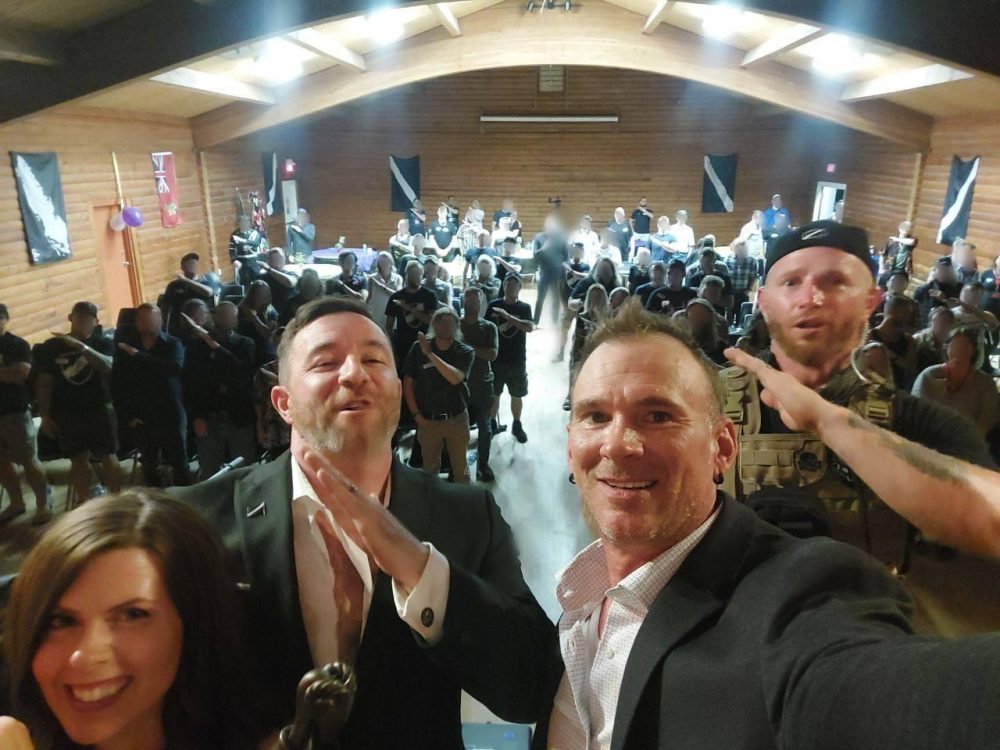
Spotting the Fash in your town:
The Diagolon team is driving in a 2009 Jayco Melbourne Class C RV (image below). While some vehicles had unmistakably white-supremacist stickers with unmistakably white-supremacist drivers, many vehicles were unmarked, and their occupants unassuming. Obtaining the first location, and locating community halls in a nearby proximity could assist you in quickly finding the final destination. Look for individuals moving between the locations and look for the RV. Security members had headsets connected to radios and some were trying to remain unseen. Inside the venue there was a lot of chanting, raucous applause and yelling of hateful rhetoric.

Some of what we know about Diagolon:
Diagolon is a violent and bigoted group, who often speak of commiting violent acts against racialized people, queers, and leftists. They are highly nationalistic, self described white supremacists, and avowed accelerationist neo-nazis who claim they would die for their cause. Several of their members, including their founder Jeremy Mackenzie have violent pasts, including weapons and assault charges. The group came to national headlines during the Coutts border blockade in relation to the anti-vaxx protests in February of 2022 in which several Diagolon members were arrested in possession of semi-automatic rifles and armour plated vests adorned in Diagolon patches. They have openly boasted about their recruitment success in the Canadian Armed Forces (several of their followers have been confirmed to have served or currently serve in the military), and have at least one former Toronto Police Sargeant in their ranks. In clips pulled from Jeremy Mackenzies podcast The Raging Dissident he often calls for the murder and expulsion of Indians, Sikhs, Chinese, Somalians, leftists, Jews, political opponents and queers while rambling nonsensically about pseudo-scientific racial hierarchies while in fits of barely controlled rage. Jeremy Mackenzie currently lives in the town of Pictou Nova Scotia, according to his Wikipedia page, a town of just over 3100 people.
Where do we go from here:
Diagolon and their growing group of followers emerge through state-sanctioned racist, homophobic, and bigoted world views. Many of their compatriots were radicalized during the lockdowns, and often participate in anti-mask, and anti-sogi demonstrations. While we too desire for another world, our desires are incompatible with celebrations of hate and any white ethno-state-making project. Beyond collecting information, a surveillance mission with a group of trusted friends is a great way to build trust, sharpen your skills, escalate your sneak, and be better equipped for the next time fash bubble up in your town. Be sure to protect each other in tangible ways, and be ready for confrontations. Diagolon members often lament about their wishes to beat up or kill anti-fascists. This should scare you, it should also sharpen your resolve and activate you and your community. The state will not save us, whether they label groups like Diagolon & The Proud Boys terrorist organizations or not. We need to increase our communities capacities to take these groups on and protect each other in the streets and in our homes. Self defense means literally fighting back.
From Indymedia.de, translated by Act For Freedom Now!
May 6, 2024
Around the world, countless indigenous communities are fighting extractivist projects and infrastructures, such as mining projects, hydraulic fracking, deforestation and pipelines. In the territory occupied by the Canadian state, for example, a huge project is currently under construction: the Coastal GasLink Pipeline, designed to transport gas extracted by hydraulic fracking. This project not only destroys entire regions, but also threatens the Wet’suwet’en indigenous way of life. The pipeline is to be built on their territory, crossing the Wedzin Kwa River, which is essential to their way of life as a source of water and fish. That’s why the Wet’suwet’en have long opposed this project with fierce resistance, defending their land. Their resistance is met with strong repression, but also benefits from great solidarity.
We want to show that the fight against colonization, and therefore against industrialization and destructive extractivism, knows no borders. That’s why we have attacked a company that participates and enriches itself directly on the destruction of indigenous territories: the Bauer company supplies the drilling rigs needed for the Coastal GasLink pipeline. On May 6, we set fire to two of their huge drilling machines at a construction site in Berlin. To do this, we placed incendiary devices, accelerant and a tire on their cables.
The Coastal-Gaslink pipeline is just one of many extractivist projects on stolen indigenous lands in Canada and around the world. Whether it’s oil, gas, coal, gold, lithium or hydroelectricity and wind power (now expected to produce “green” hydrogen in Canada, of great interest to Germany), all these industrial projects are part of a colonial system that destroys the land and eliminates indigenous ways of life.
We stand in solidarity with the Wet’suwet’en struggles against the colonial Coastal-Gaslink pipeline project.
Whether in Canada, Chile, Peru, the Hambach forest or northern Portugal, let’s fight destructive extractivist projects and connect our struggles!
Switch off the system of destruction and colonisation!